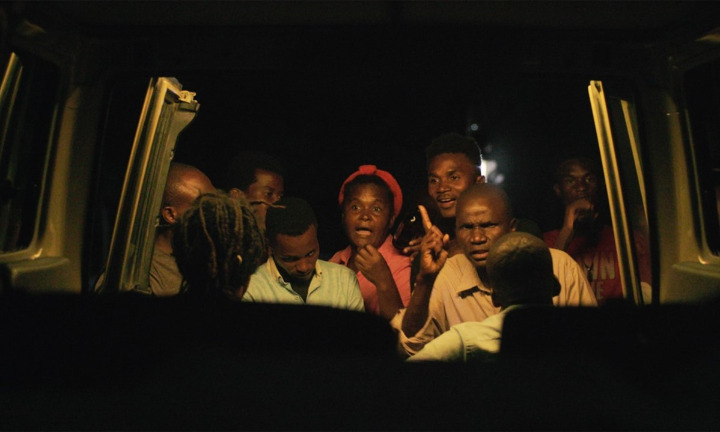In Haiti, the term zo reken (meaning “Shark Bone”) refers both to a local cane alcohol and the popular 4×4 Toyota Land Cruiser that can be seen weaving through the congested streets. Frequently used by both Non-Governmental Organizations (NGOs) and the police, the vehicle is both a source of humanitarian aid and a symbol of repression. In zo reken, director Emanuel Licha’s uses the powerful all-terrain vehicle as a metaphor for the inequality that divides Haiti.
Primarily placing the audience within the interior of a zo reken, Licha’s documentary provides an intimate look at a country in crisis. It has been 11 years since a massive earthquake ravished Haiti and the shattered country is still picking up the pieces. Featuring some of the highest rates of poverty in the Western hemisphere, Haiti and its deplorable governments have mismanaged the economy and education system while their poor distribution of foreign aid has led to frustration and frequent protest. As “the driver” in the 4×4 that guides Licha and other passengers around discovers the hard way, even navigating the streets can become a political minefield. One wrong turn can lead to being stuck on a barricaded street, where black smoke billows from barrels on fire and pelted rocks are regular signals of displeasure.
One can understand the sense of rage that has been birthed from decades of political corruption and abuse of power from law enforcement. Through the windows of the zo reken, Licha’s camera catches each look of suspicion from the sullen pedestrians that the vehicle passes. Unsure if the vehicle is there to hurt them or help them, their faces carry a frustrated weariness that is piercing and haunting. However, even those whose who use the Toyota Land Cruiser to administer aid, are now met with the same sense of distrust.
The NGOs carry a level of power and privilege that the average citizens could only dream of. In fact, as Licha’s documentary notes, the structures that help these organizations administer supplies allows for further corruption. The NGOs may claim to be providing lifelines to those in need, but many are throwing anchors that keep the people they proclaim to help in the vicious cycle of poverty.
While zo reken provides glimpses into the warehouses where NGOs house their supplies, the bulk of the documentary plays like a road movie. As “the driver” travels around Haiti, he chats with various individuals who spend time in his vehicle. This ranges from academics to average citizens who simply need a ride. By never identifying the individuals the driver converses with and relying on voiceovers from the talk radio station to set the volatile climate, Licha forces the audience to really focus on the discussions at hand. Broaching everything from the failings of President Jovenel Moïse to the state of the education system to the sexism that has forced many women to work hard, there is plenty to chew on in the film.
Although it is easy to get swept up in the intriguing conversations, one is always aware that the zo reken provides a safety bubble from the outside world. There is a dreamy allure to the way Licha constructs the film. People appear in the car to share their stories, some clearly invited while others seemingly random, as if one was trapped in a fluid and fascinating daydream. The sounds of rocks bouncing off the frame of the 4×4 during certain conversations are like warning alarms abruptly reawakening the audience to the harsh realities that lay outside. While the colourful musical moments that bookend the film, which start off jubilant and move to rousing calls to activism, are reminders of directorial stylistic manipulation at play, it all manages to work brilliantly.
Offering a unique and intimate portrait of both a nation and an international aid model in desperate need of change, zo reken is an absorbing work.
zo reken screens at Hot Docs 2021. Read more about the film in our interview with director Emanuel Licha.











